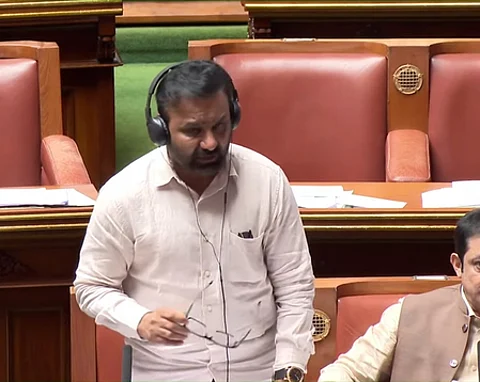

The Karnataka Assembly on Tuesday passed a bill to ensure the rights of gig workers, placing the obligation on aggregators or platforms about social security, including occupational health and safety.
The Karnataka Platform-Based Gig Workers’ Social Security and Welfare Bill was tabled in the Assembly, and after discussion, was passed in the House. It aims to ensure social security for gig workers in the state.
Key provisions of the bill include the creation of a dispute resolution mechanism, the establishment of a Gig Workers’ Welfare Board, the formation of a welfare fund, registration of platform-based gig workers with the board, and mandatory registration of aggregators. The bill also seeks to provide reasonable security to gig workers.
The board will include four representatives from gig workers, representatives from aggregators, and two representatives from civil society. It will oversee registrations and will have the power to enter into agreements between aggregators and gig workers to prevent indiscriminate termination in the event of disputes.
State Labour Minister Santosh Lad, after tabling the bill, stated, “The Karnataka Platform-Based Gig Workers’ Social Security and Welfare Bill has been presented for the first time in the state. Gig workers are those employed by online platforms for services such as goods delivery and others. These include divisions such as food and grocery deliveries, logistics, e-market, business-to-business, business-to-customer, health services, travel, hospitality, and more.
“Under Section 2E, the definition of a gig worker is a person who performs work or participates in a work arrangement that results in payment at a given rate, as per the terms of a contract, and whose work is sourced through a platform in the services specified in the schedule. Those who conduct transactions through these platforms are called gig workers, forming what is referred to as the gig economy. It is to regulate this new concept that the bill is being introduced,” he stated.
“Today, e-commerce and food delivery services are expanding on a large scale year after year. According to a NITI Aayog report, by 2029-30, about 23.5 million workers will be employed as gig workers, creating many opportunities in this sector,” Lad said.
“In Karnataka, about 4 lakh people are currently working as gig workers, many on both a full-time and part-time basis. Other countries have enacted similar laws: Spain has the Riders’ Law, Singapore has the Platform Workers’ Law, and such laws are also in place in Korea, Indonesia, and Malaysia. This bill is being presented on the same lines to bring gig workers under a legal framework,” the minister added.
Highlighting the challenges faced by workers, he said, “Gig workers, especially two-wheeler riders, are more exposed to noise and environmental pollution. I met workers, who said they must work 18 hours to earn Rs 1,800, taking on 25 to 30 delivery tasks a day amid traffic. In Bengaluru, workers often need to put in 16 hours to earn Rs 1,600."
“The permissible CO2 exposure limit is 3.5 litres, but gig workers inhale nearly 40 litres, as per my information. They also consume significant amounts of carbon monoxide, putting their health at risk. A 2018 study suggested that an auto driver or gig worker inhales pollution equivalent to smoking 10 cigarettes per day. Even without smoking, they are forced to consume this through the air. If someone works for 20 years under such conditions, their future will be in jeopardy.”
“That is why this bill has been introduced to ensure social security for gig workers. We consulted stakeholders, including the IT/BT and Industries ministries, before bringing this legislation,” Lad said.
He further clarified, “We will collect a welfare fee ranging from one to five per cent. This does not come under the Industrial Disputes Act, nor does the Minimum Wages Act apply here.”
BJP MLA S. Suresh Kumar welcomed the bill, stating, “In 2019, when I was Labour Minister, I called gig workers and officers to discuss their interests. This is a good step. The gig economy is the new norm. Along with protecting gig workers’ interests, the government must also consider unorganised workers. For instance, in Karnataka, 3.8 lakh outsourcing workers are deputed, especially in the Energy Department, working as station operators, assistants, and gangmen. They don’t have social security. I suggest including them in the bill.”
Deputy Opposition Leader Arvind Bellad also welcomed the legislation, saying, “In 2020, the Central government brought a similar bill in Parliament. According to NITI Aayog, by 2029-30, about 4.1 per cent of workers in the country -- nearly 2.5 crore -- will be gig workers. This is a huge number. Bihar and Rajasthan have already enacted similar laws, and now our state has done the same. Private sector workers must also be considered for inclusion.”